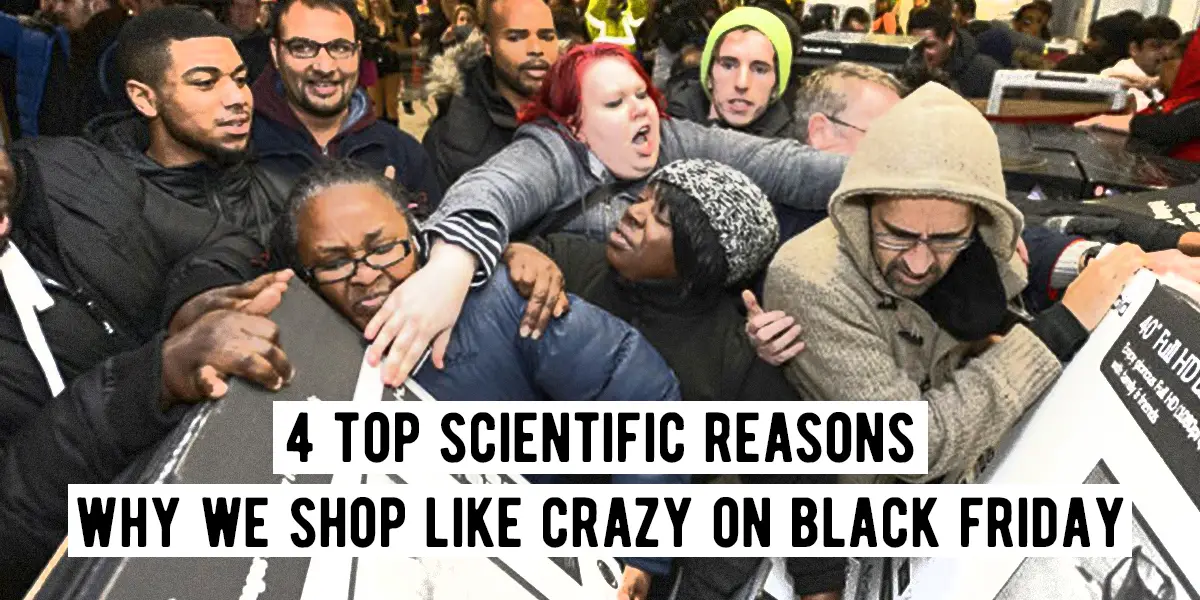4 Top Scientific Reasons Why We Shop Like Crazy On Black Friday

In our rush to worship at the altar of indulgence we have become heavily dependent on the idle fantasies of mass consumerism. Personal credit allows us to make purchases beyond our income-level. Advertisements subtly reshape our desires around material possessions. And the materialistic culture that surrounds us begins to make excessive consumption appear natural and normal. In the run up to Black Friday, stores have been “leaking” deals since October and teasing you with special online discounts and flash sales. We all know that there is no escaping Black Friday madness, but, why do we buy into the Black Friday hype? Why do we camp out ahead of a doorbuster run or elbow people out of the way so that we can get our hands on the ‘latest’ flat screen TV? According to two consumer scientists, there are some key reasons why we shop like crazy.
Deals Feel Good
James Mourey, assistant professor at the Driehaus College of Business at DePaul University, says that seeing something you like activates the nucleus accumbens – this is central to the brain’s reward centre and makes us feel good. “Any time people shop and they find a great deal, there’s that psychological joy of pleasure,” he said.
Limited Sales Create A Sense Of Urgency
“A major focus of Black Friday is having shoppers focus on a particular, very limited sale opportunity,” says Laura Brannon, a social psychologist who researches consumer psychology. “Opportunities are more desirable the more restricted they are,” and the language used in marketing promotions such as “ supplies are limited” and “get it before it’s gone” emphasise this. The idea that the item is scarce gets shoppers thinking in an irrational way. “Even though people might be somewhat annoyed by feeling manipulated, they still think it’s a good deal,” Brannon says. “They can’t stand the idea of maybe missing out on a bargain.”
Making A Purchase Justifies The Time Commitment
If you have slept outside a store, woken up early, waited in line for hours on end and then rushed in when the doors open, you have to feel that your efforts were worth it. Brannon refers to the “consistency and commitment” principle” and says that “once retailers get shoppers to get up early and wait in long lines, they feel somewhat obligated to buy something to justify all of that effort.”
Deal Teasers Build Up Anticipation
Retailers send previews of deals from as early as October, and Brannon says that this “creates a sense of anticipation” which leads to wanting something even more. In addition, emails and promotions from retailers often require you to click through for more information and this is an interactive game-based approach to marketing. Mourey says “We’ll give you a sneak peek of what’s going to happen and to whet your appetite, as opposed to just telling you,” he says. “If we just told you, it’s going to get lost in all the announcements that are out there.”
People are going into debt so that they can have the latest electronics, swiping their credit card for every tablet and flat screen TV they see on sale. What’s funny is that most retailers slowly increase prices before the holiday and then drastically cut them for Black Friday. This means that you’re probably paying the same price as you could have in July. Furthermore, some of the sale items are actually sub-models of their brand counterparts. For example, there are many television models exclusively produced for the holiday season. These are inferior models, which have lesser parts and aren’t built to last and break soon after purchase, but hey, you got a deal right?
Read more: 5 Ways To Help You Stop Going Broke (Video)
Leave Comment: